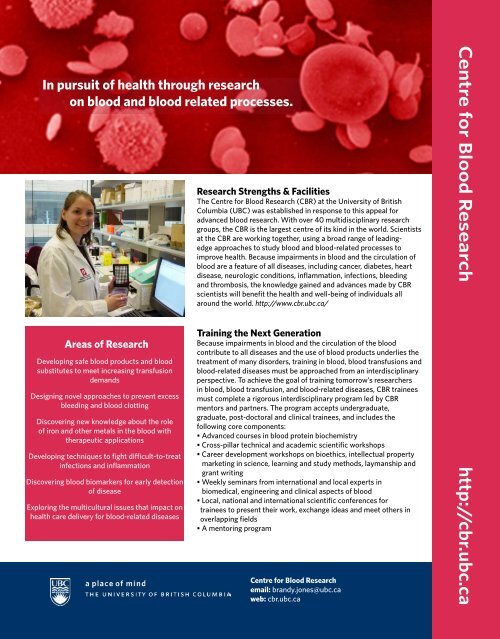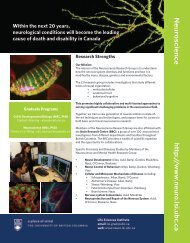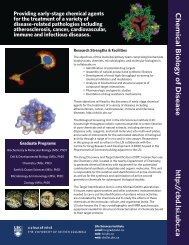Grad School @ UBC - Life Sciences Institute - University of British ...
Grad School @ UBC - Life Sciences Institute - University of British ...
Grad School @ UBC - Life Sciences Institute - University of British ...
Create successful ePaper yourself
Turn your PDF publications into a flip-book with our unique Google optimized e-Paper software.
In pursuit <strong>of</strong> health through research<br />
on blood and blood related processes.<br />
Areas <strong>of</strong> Research<br />
Developing safe blood products and blood<br />
substitutes to meet increasing transfusion<br />
demands<br />
Designing novel approaches to prevent excess<br />
bleeding and blood clotting<br />
Discovering new knowledge about the role<br />
<strong>of</strong> iron and other metals in the blood with<br />
therapeutic applications<br />
Developing techniques to fight difficult-to-treat<br />
infections and inflammation<br />
Discovering blood biomarkers for early detection<br />
<strong>of</strong> disease<br />
Exploring the multicultural issues that impact on<br />
health care delivery for blood-related diseases<br />
Research Strengths & Facilities<br />
The Centre for Blood Research (CBR) at the <strong>University</strong> <strong>of</strong> <strong>British</strong><br />
Columbia (<strong>UBC</strong>) was established in response to this appeal for<br />
advanced blood research. With over 40 multidisciplinary research<br />
groups, the CBR is the largest centre <strong>of</strong> its kind in the world. Scientists<br />
at the CBR are working together, using a broad range <strong>of</strong> leadingedge<br />
approaches to study blood and blood-related processes to<br />
improve health. Because impairments in blood and the circulation <strong>of</strong><br />
blood are a feature <strong>of</strong> all diseases, including cancer, diabetes, heart<br />
disease, neurologic conditions, inflammation, infections, bleeding<br />
and thrombosis, the knowledge gained and advances made by CBR<br />
scientists will benefit the health and well-being <strong>of</strong> individuals all<br />
around the world. http://www.cbr.ubc.ca/<br />
Training the Next Generation<br />
Because impairments in blood and the circulation <strong>of</strong> the blood<br />
contribute to all diseases and the use <strong>of</strong> blood products underlies the<br />
treatment <strong>of</strong> many disorders, training in blood, blood transfusions and<br />
blood-related diseases must be approached from an interdisciplinary<br />
perspective. To achieve the goal <strong>of</strong> training tomorrow’s researchers<br />
in blood, blood transfusion, and blood-related diseases, CBR trainees<br />
must complete a rigorous interdisciplinary program led by CBR<br />
mentors and partners. The program accepts undergraduate,<br />
graduate, post-doctoral and clinical trainees, and includes the<br />
following core components:<br />
• Advanced courses in blood protein biochemistry<br />
• Cross-pillar technical and academic scientific workshops<br />
• Career development workshops on bioethics, intellectual property<br />
marketing in science, learning and study methods, laymanship and<br />
grant writing<br />
• Weekly seminars from international and local experts in<br />
biomedical, engineering and clinical aspects <strong>of</strong> blood<br />
• Local, national and international scientific conferences for<br />
trainees to present their work, exchange ideas and meet others in<br />
overlapping fields<br />
• A mentoring program<br />
Centre for Blood Research<br />
email: brandy.jones@ubc.ca<br />
web: cbr.ubc.ca<br />
Centre for Blood Research http://cbr.ubc.ca





